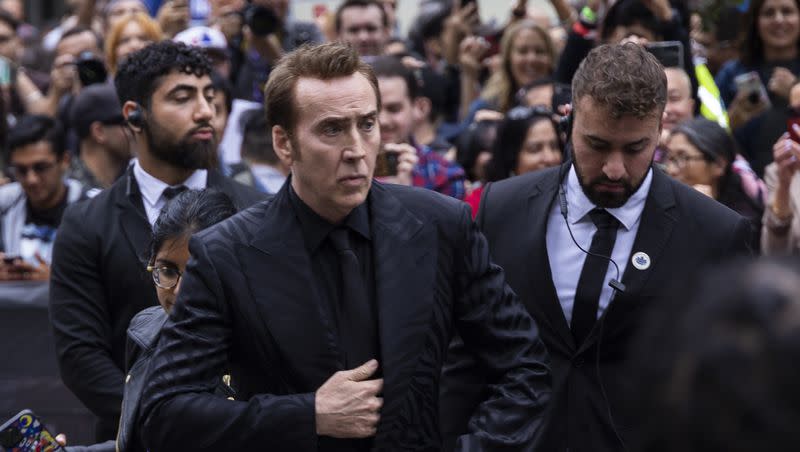Perspective: Is Hollywood courting or mocking the right in ‘Dream Scenario’?

- Oops!Something went wrong.Please try again later.
- Oops!Something went wrong.Please try again later.
In the new Nicholas Cage film “Dream Scenario,” there’s a scene where a group of college students are having a session of what is known as exposure therapy, being gradually exposed to something that scares them in order to lessen their fear.
In this case, the students are frightened by Cage’s character, Paul Matthews, a painfully ordinary biology professor who poses no threat to anyone other than putting them to sleep with his discourses on why zebras have stripes.
The facilitator of the session first shows the students a picture of Matthews, then invites him to enter the room and come closer ... then closer ... then closer ... at which point the terrified students flee the room.
The word wasn’t used, but the scene reminded me of the disparaging word many people use to describe young people who are easily triggered: snowflakes. The scene could have been part of a Daily Wire movie if, instead of Cage, the object of fear was, say, Jordan Peterson or Mike Pence.
But this was Hollywood, and “Dream Scenario” has been called “a takedown of cancel culture,” and in many ways it is. It’s hard to tell, though, if it’s a takedown of cancel culture on the right or the left. A few years ago, when the organized shunning of a person with unpopular opinions was given this name, it was largely conservatives being targeted.
Evan Nierman, the author of “The Cancel Culture Curse,” told me that when he first started working on the book, people assumed he was approaching the subject from the right. He was not — he is politically independent and says cancel culture claims victims on both the left and the right. (In fact, some liberals accuse conservatives of embracing cancel culture in their boycotts of Target and Bud Light.)
But it’s true that when you hear about protests on college campuses over a speaker, typically the speaker is a conservative, like Charlie Kirk or Candace Owens. And when it comes to college professors losing their jobs over their beliefs or statements, it was rare to find a liberal in that position (although that has changed since the Hamas attack on Israel).
Kristoffer Borgli, the film’s writer and director, has said he got the idea for the script after reading about professors who lost jobs or tenure after being accused of one thing or another: mostly “stupid things they said or not being delicate enough about certain points of view, personal points of view about topical things that in some cases maybe deservedly got them fired, and (in) other cases seemed ridiculous.”
As Yahoo News reported, Borgli said, “There was a huge discrepancy between sort of the students’ point of view and then what they had experienced.”
But he noted that it’s wrong to say that “Dream Scenario” is about cancel culture alone; it operates on multiple levels, and Borgli said, “mostly it was a character investigation, a character portrait of a very principled man who step by step loses every single one of his principles by way of engaging with the public consciousness.”
Related
Evan Nierman on the ‘least cancelable person on the planet’ and how to end cancel culture for good
Cancel culture is entering a dangerous new phase. But there’s a key to getting out
In that way, the film radically departs from being about cancel culture, because most people who are canceled — or who are the target of a cancellation campaign, but prevail against it — find themselves in this position because of their principles and their unwillingness to abandon them. J.K. Rowling and Jordan Peterson, for example, have been “canceled” by progressives repeatedly and have not apologized for their positions, nor changed them.
In contrast, the writer Elizabeth Gilbert, who became famous for her memoir “Eat Pray Love,” was said to have canceled herself earlier this year by delaying the publication of a new book set in Siberia in the 1930s, because of the objection of some Ukrainian fans.
In “Dream Scenario,” Cage’s character released a tearful and groveling apology even though he had done nothing wrong; people were upset by him because he’d appeared in their dreams. Mercifully, in her video, Gilbert did not apologize for writing the book, but said that she understood the Ukrainians’ point of view and would do a “course correction” by pulling the book, even though it in no way relates to the Russia-Ukraine war.
Once again, The Daily Wire’s satirical films come to mind; Gilbert’s announcement is fine fodder for ridicule by the right, especially now that conservatives are increasingly souring on the subject of aid to Ukraine.
Like Borgli, Cage has downplayed claims that “Dream Scenario” is a film about cancel culture, saying that it is more about the “memeification” of Paul Matthews and of actors like himself, who become something very different to the public than they are in real life. Borgoli also said the film “explores what it feels like to become a personal brand outside of your control and how capitalism will always come in to piggyback off of anything that’s on the conversation at large.”
All that is true. But it’s also true that a film about a man who has done nothing wrong — but got caught in societal crossfire anyway, and suffered — will resonate with conservatives. Maybe The Daily Wire will yet take it on.

